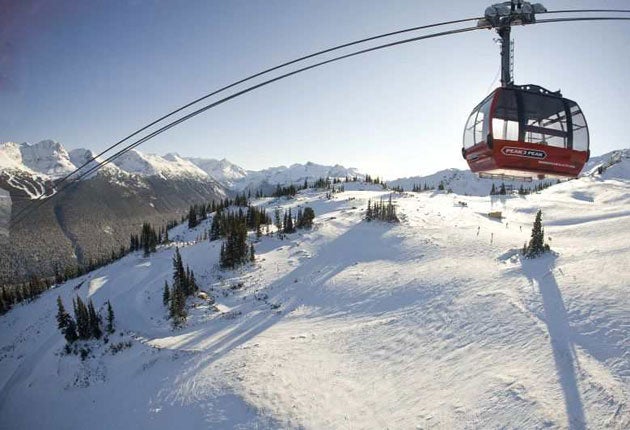Mount Olympics' new lift deserves a medal
The Peak 2 Peak gondola, linking Whistler and Blackcomb mountains, is an awesome feat of engineering. Minty Clinch reports

'Whistler now has a guest experience that won't be surpassed for many years." With these portentous words, a strong Mounties presence and triple ribbon-snipping by linked local dignitaries, the inaugural scarlet Peak 2 Peak gondola between Whistler and Blackcomb mountains slid out into the void.
I fought my way into the third cabin, one of two silver ones with glass bottoms. If you're prepared to stare 436m straight down, you might as well go for the full monty.
Last Tuesday, four days after these celebrations, a tower failed on the Excalibur Gondola at the base of Blackcomb mountain, leaving 53 people stranded a modest 9m above the ground for more than three hours. Lucky Whistler: no serious injuries or serious damage to its cherished image as the malfunction occurred after the world's media had moved on.
Happily unaware of what the future held, I was able to relax and admire Peak 2 Peak's awesome engineering. At 4.4km, this baby is the longest as well as the highest of its kind in the world. It has the greatest single span, an intimidating 3.02km, between its main load-bearing pylons. Peak 2 Peak cost £28m and took nearly two years to build. It is misnamed, but Shoulder 2 Shoulder does not have the same resonance.
That, however, is what it is. As one perceptive spectator observed, the new mid-mountain connection saves Whistler from its dodgy maritime climate. When the lower slopes are soggy, as they frequently are, they can now be bypassed by Peak 2 Peak, allowing skiers and boarders to switch between the superbly rugged terrain at the top of both Whistler and Blackcomb in 11 minutes, rather than take a connecting bus at the bottom.
For this convenience, they will pay a supplement on the regular lift pass. No surprises there: Intrawest, Whistler's owners, have always nurtured a slot machine jammed on pay.
For years, they've endorsed green values by declaring a moratorium on further expansion, but the resort that changed its name from London Mountain in 1966 in honour of the whistling marmots that occupied the municipal dump at its heart has been reinventing itself ever since.
Growth and more growth was the mantra even before it acquired the lion's share of the snow events for Vancouver's Winter Olympics, due to be held in February 2010. What credit crunch? No sign of it among the builders who are constructing athletes' accommodation, bobsleigh tracks and other Olympic paraphernalia.
Whistler deserves a shot at Olympic glory, not least because its dreams are in tune with the Games' commercial objectives in the 21st century. Appropriately, the blue riband downhill events will be held on the Dave Murray run, named for the Crazy Canuck racer who died too young, a location above Creekside that barely impacts on the main ski areas on Whistler or Blackcomb. However, the supporting cast will enjoy the luxurious hotels, restaurants and bars that underpin Whistler's annual return as the best resort in North America in Skiing Magazine.
Resuming the Olympic trail on the road back to Vancouver required a detour to Cypress Mountain, venue for the freestyle skiing and snowboarding competitions. Essentially, one of several town hills for Vancouver, Cypress is the antithesis of Whistler. Located in a provincial park, it has no accommodation and very few facilities.
On the plus side, it is compact, friendly and ski-in, ski-out, with extensive trails on three mountains, superior snow and spectacular views over the city 20 minutes' drive down the hill. As the aptly named Kent Rideout, the director of the Snow School, put it: "If you like real life, you live in Vancouver and board in Cypress." He didn't elaborate on the implied comparison with Whistler, but we got the message.
How to get there
Inghams (020-8780 4447; www.inghams.co.uk) offers seven nights' room only at the Fairmont Chateau Whistler from £829 or Four Seasons Resort from £1,167, based on four sharing, including return flights to Vancouver and transfers. Six-day adult ski and boot hire costs from £72, six-day adult snowboard and boot hire from £90. Three-day ski or snowboard tuition costs from £117. A six-day area pass costs from £194.
Further information:
Tourism British Columbia ( www.british columbia.travel/ski).
Join our commenting forum
Join thought-provoking conversations, follow other Independent readers and see their replies
Comments
Bookmark popover
Removed from bookmarks